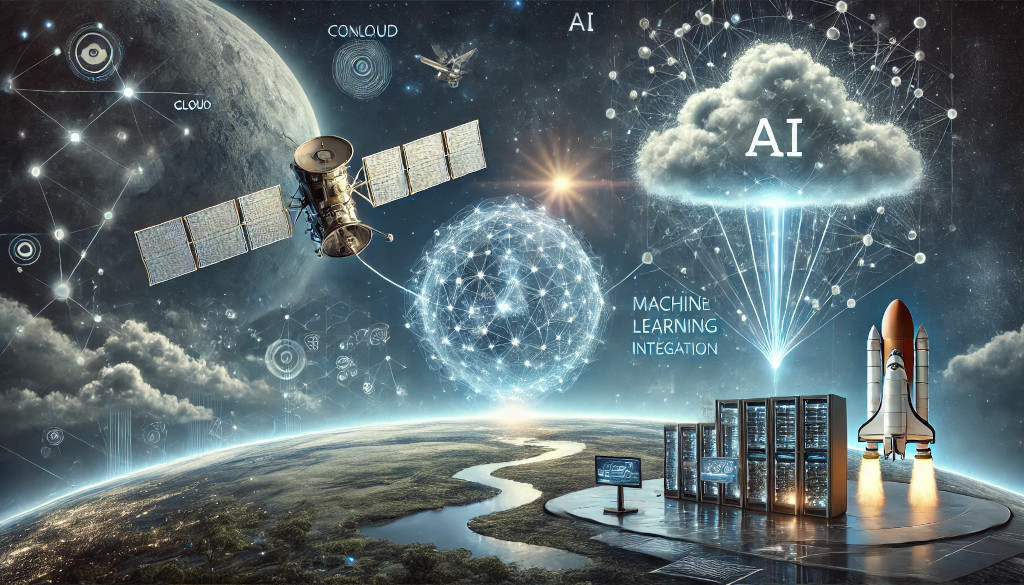Cloud services have become indispensable in the data-intensive field of space exploration. With spacecraft, rovers, satellites, and space telescopes generating vast amounts of data, cloud platforms like Amazon Web Services (AWS), Microsoft Azure, and Google Cloud Platform (GCP) play a critical role in storing, processing, and analyzing this data efficiently. These platforms provide scalable computing power and machine learning (ML) services that significantly enhance AI’s role in space missions.
Amazon Web Services (AWS) in Space Exploration
AWS has been instrumental in supporting space missions, particularly through its AWS Ground Station service. This service provides satellite operators with direct access to AWS cloud services for data analysis, storage, and machine learning. By integrating AWS machine learning services such as Amazon SageMaker, space agencies can develop models that process satellite imagery in real-time, detect anomalies, and optimize mission performance. AWS’s high-performance computing capabilities also aid in mission simulations, data modeling, and signal processing.
Microsoft Azure in Space Exploration
Microsoft Azure offers a range of tools, including Azure Orbital Ground Station and Azure AI, that are geared toward supporting space exploration. Azure Space collaborates with satellite operators, including SpaceX’s Starlink, to provide high-speed data transmission and cloud storage from orbit. Azure’s Machine Learning Studio enables researchers and engineers to create, train, and deploy AI models for tasks like satellite data processing, planetary mapping, and space mission optimization. Azure AI services have been used to support space agencies in processing petabytes of data generated from satellite imagery to uncover patterns and insights.
Google Cloud Platform (GCP) in Space Exploration
Google Cloud’s powerful data analytics and AI services play a key role in helping scientists and engineers process and analyze space data. The Google AI suite, combined with BigQuery for large-scale data analytics, allows for real-time analysis of astronomical data and satellite imagery. For example, GCP’s machine learning services are used to automate the classification of space objects, detect anomalies in spacecraft performance, and simulate space environments. Through GCP’s advanced tools, space agencies can make informed decisions faster and with greater accuracy.
Case Study: FDL and Cloud Services
FDL.AI is a public-private partnership AI research initiative with NASA, Google Cloud and Nvidia and other leading research organizations in the US. FDL has leveraged cloud platforms for AI-driven research. FDL uses AWS and GCP machine learning models to analyze satellite imagery, predict space weather, and map planetary surfaces. This partnership highlights how cloud services enable rapid experimentation and large-scale data processing, critical for modern space missions.
Benefits of Cloud-Enabled Machine Learning in Space Exploration
- Scalability: Cloud platforms provide scalable computing resources to handle the massive influx of data from space missions, allowing AI models to process information without the limitations of on-premise hardware.
- Real-Time Analysis: Using machine learning in the cloud, space missions can analyze data in real-time, enabling autonomous decision-making and immediate responses to changing conditions.
- Cost-Effectiveness: Cloud services offer a pay-as-you-go model, reducing the costs of data storage, processing, and AI model training for space agencies.
- Collaboration: Cloud platforms enable easy sharing of data and resources among international space agencies and research organizations, fostering collaboration in space exploration efforts.
Conclusion: The Future of Space Exploration is in the Cloud
The vast amount of data generated by space exploration presents a challenge, but also an opportunity. Cloud services with their scalable computing power and advanced machine learning capabilities are transforming how we explore the cosmos. From enabling real-time analysis for autonomous decision-making to fostering collaboration on a global scale, cloud-based AI is ushering in a new era of space exploration. As we push the boundaries of human knowledge and venture further into the unknown, cloud services and machine learning will be essential partners in unlocking the secrets of the universe.

Leave a Reply
You must be logged in to post a comment.